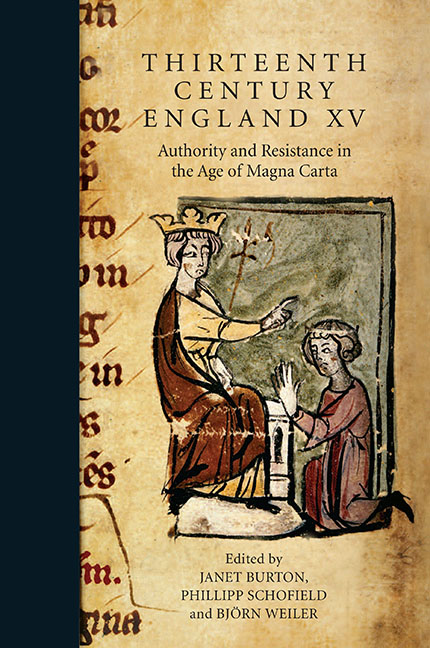 Thirteenth Century England XV
Thirteenth Century England XV Published online by Cambridge University Press: 11 June 2021
To date, greater consideration has been given to the rebels and main players in the Barons’ War than to their royalist opponents, with particular emphasis on their reasons and justifications for rebellion, the consequences of their actions, and their impact on the political, legal and socio-economic landscape. It may be assumed that the motivations of the rebels provide a greater platform for study, especially for understanding the zeitgeist of the 1250s and 60s, and the reasons for the dramatic events, shifts and tensions which took place within it, on a micro- as well as a macro-level. The motivations of the royalists, however, have been examined less thoroughly. There have been a few exceptions, including Barry Kelly's article, ‘A Royalist Perspective on the Barons’ War 1264–5’, but on the whole, and certainly in recent publications, less attention seems to have been paid to the supporters of the king's cause in their own right than the rebels and leading figures such as Simon de Montfort.
Rebellion and the nature of rebels as political agents are, naturally, subjects to which much sociological and political theory has been devoted. Marxist theories and interpretations have coloured the historical views on peasant rebellions, and in the early 1990s Roger Petersen put forward a community-based theory of rebellion which could also be transferable in principle to the community-centric context of thirteenth-century England. Arguably, the March of Wales, formed of individual lordships and border baronies each with its own individual character and context, provides an ideal basis for a case study in which communities within the March found themselves in violent opposition to one another. Extended families found themselves at odds and on either side of the rebellion; it was not the case that all individuals were united by a family policy, unanimously favouring one side over the other, nor that families were united according to the wishes of their respective heads, as will be shown in this present study. The following case study is intended to illustrate the kinds of discrete individual decisions and actions that could be applied in such circumstances, through one member of a middle-ranking Marcher family, Thomas Corbet.
To save this book to your Kindle, first ensure [email protected] is added to your Approved Personal Document E-mail List under your Personal Document Settings on the Manage Your Content and Devices page of your Amazon account. Then enter the ‘name’ part of your Kindle email address below. Find out more about saving to your Kindle.
Note you can select to save to either the @free.kindle.com or @kindle.com variations. ‘@free.kindle.com’ emails are free but can only be saved to your device when it is connected to wi-fi. ‘@kindle.com’ emails can be delivered even when you are not connected to wi-fi, but note that service fees apply.
Find out more about the Kindle Personal Document Service.
To save content items to your account, please confirm that you agree to abide by our usage policies. If this is the first time you use this feature, you will be asked to authorise Cambridge Core to connect with your account. Find out more about saving content to Dropbox.
To save content items to your account, please confirm that you agree to abide by our usage policies. If this is the first time you use this feature, you will be asked to authorise Cambridge Core to connect with your account. Find out more about saving content to Google Drive.